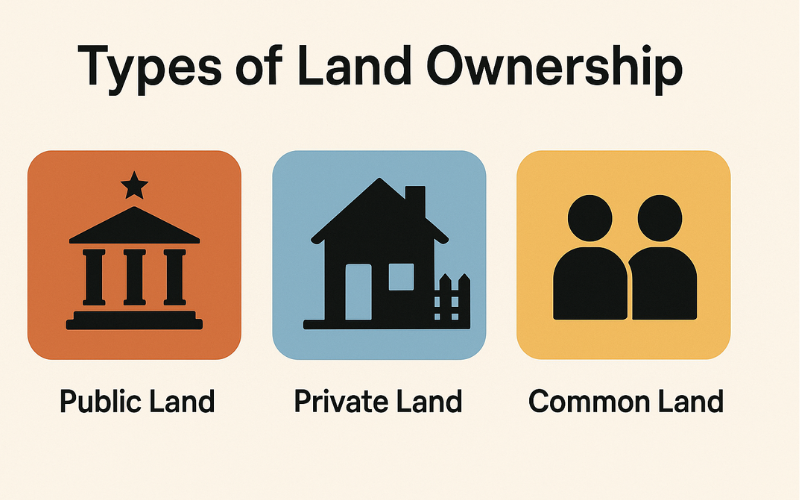Understanding who can own land in Pakistan is essential for anyone looking to invest, inherit, or develop property in the country. Land ownership is deeply intertwined with constitutional rights, provincial laws, and evolving regulations that protect both public and private interests.
The Constitution of Pakistan serves as the supreme legal framework governing land ownership, acquisition, and usage. Articles such as 23, 24, 172, and 173 provide insight into both individual and state ownership rights. Whether you’re a citizen, a business, or a foreign national exploring property ownership, this guide outlines the legal landscape in 2025 with clarity and authority.
Legal Foundations of Land Ownership in Pakistan
The Constitution of Pakistan 1973 lays down the legal bedrock for land ownership. Key constitutional provisions that address land-related rights include:
- Article 23: “Every citizen shall have the right to acquire, hold and dispose of property in any part of Pakistan, subject to the Constitution and any reasonable restrictions imposed by law in the public interest.”
- Article 24: Safeguards against arbitrary deprivation of property, while allowing for compulsory acquisition with compensation.
- Article 172: Establishes state ownership of lands, minerals, and natural resources where there is no rightful private owner.
- Article 173: Enables both the federal and provincial governments to own and manage land and resources.
Key Takeaways:
- Constitutional rights related to land in Pakistan protect ownership while allowing the state to regulate or acquire land for public good.
- Land ownership laws for citizens in Pakistan are designed to balance individual rights with national interests.
Who Can Legally Own Land in Pakistan?
The right to own land in Pakistan depends on the entity and purpose of ownership. Below are the categories of persons and institutions permitted to own land:
1. Pakistani Citizens
- All Pakistani nationals have the constitutional right to own land.
- This includes residential, agricultural, and commercial land, subject to zoning and usage laws.
2. Government Entities
- The federal and provincial governments own land for infrastructure, defense, and public purposes.
- Government agencies may lease or allocate land under specific programs or development plans.
3. Legal Persons (Companies & Societies)
- Registered companies, cooperative housing societies, and trusts can own land in Pakistan.
- Land ownership must comply with sectoral regulations (e.g., SECP, Cooperative Societies Act).
4. Foreign Nationals
- Foreigners cannot directly own freehold land unless explicitly allowed.
- Options include:
- Long-term leases
- Joint ventures with Pakistani citizens
- Special economic zones (SEZs) with foreign investor privileges
- Long-term leases
Types of Land Ownership
Land ownership in Pakistan can take several forms, each governed by separate rules:

1. Private Ownership
- Held by individuals or institutions
- Subject to local land revenue laws and taxes
2. Government-Owned Land
- Managed by federal or provincial authorities
- Often used for public utilities, military, and welfare schemes
3. Community Land
- Exists in tribal areas and some rural zones
- Administered by local customs or jirgas
4. Joint Ownership
- Property held by two or more individuals (e.g., family inheritance or business partners)
Real Example:
In Balochistan, large tracts of tribal land are collectively managed by the tribe and cannot be sold individually without consensus.
Rights and Restrictions
While ownership is a right, it is not absolute. The Constitution allows state intervention in public interest, particularly under Article 24.
Key Restrictions:
- Land acquisition for public use (infrastructure, highways, etc.)
- Zoning laws may restrict land usage (e.g., agricultural vs. commercial)
- Environmental and mining regulations for land with natural resources
Compensation Principle:
“No person shall be compulsorily deprived of their property save in accordance with law, and with compensation.” — Article 24(2), Constitution of Pakistan
Federal vs. Provincial Jurisdiction
The 18th Amendment to the Constitution significantly devolved land-related matters to provincial governments, although some resources remain jointly regulated.
Articles of Interest:
- Article 172(2): Ownership of land and minerals within a province belongs to that province.
- Article 173: Empowers both federal and provincial governments to acquire, hold, and dispose of property.
Real-Life Scenario:
In Sindh, mineral rights belong to the province, whereas federal laws apply to offshore resources under joint control.
FAQs & Common Myths About Land Ownership in Pakistan
Can overseas Pakistanis own land?
Yes. Overseas Pakistanis (OPs) can freely own land, subject to verification and compliance with FBR’s OP Card regulations.
Can anyone buy land anywhere in Pakistan?
No. Some areas (e.g., cantonments, tribal regions) have ownership restrictions or require special permissions.
What happens to land with no rightful owner?
Such land is classified under Article 172(1) as “belonging to the government”. It may be auctioned or allocated for public purposes.
Is inheritance of land automatic?
No. Legal heirs must register the inheritance with the local land revenue office and update the property record (Fard).
Conclusion
Land ownership in Pakistan is governed by a combination of constitutional guarantees, provincial laws, and administrative practices. While citizens and legal entities enjoy broad rights to own property, foreign ownership remains restricted and regulated.
Understanding who can own land in Pakistan is crucial for legal compliance, investment planning, and avoiding disputes. For individual cases—especially involving foreign nationals, joint ventures, or land inheritance—consulting a legal expert is strongly recommended.



Leave a Reply